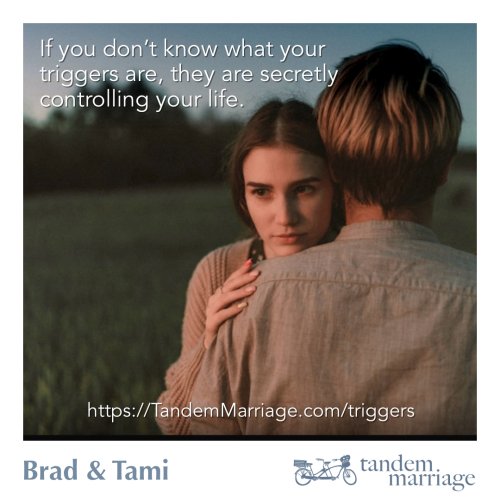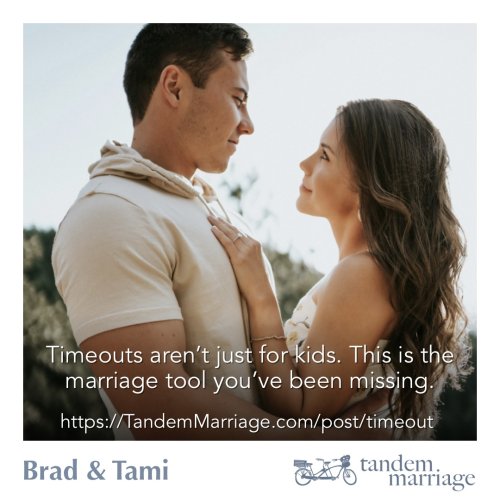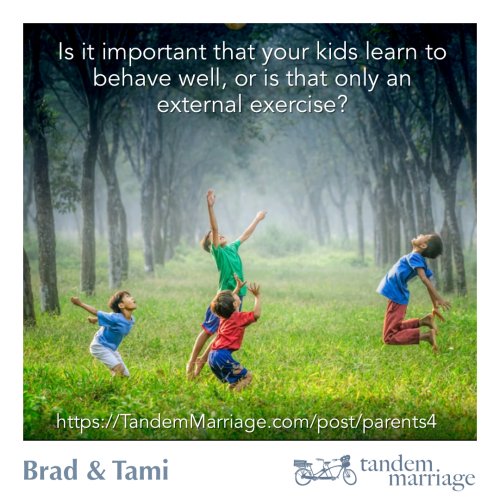We talk to couples all the time about "triggers." What are triggers and why do we have them? How do triggers affect us as individuals? How do triggers affect marriages and relationships? There is so much to learn about triggers, and so many ways that a better understanding of them can improve your marriage… so let's dive in.
By the way, this article is a bit longer than most, about 10 minutes to read, but there is so much here that is good and helpful, so we refused to shorten it!
Learning about triggers is a "must-have" skill for every married couple. If you learn better by watching videos, consider joining our Member's Video Toolbox where we feature a video on time-outs, and many more—all with discussions questions and notes. There is a series of 4 videos on triggers!
Check out our Member's Video Toolbox
WHAT IS A TRIGGER?
An emotional trigger is something that sparks an intense emotional reaction in a person, regardless of their current mood. This means that you could be happy and content in one moment, and going about your day, then get triggered and end up in a completely different (usually negative) kind of mood. If you can recall a time when you saw someone (or yourself) go from happy to sad, angry, or frazzled in about 5 seconds, then you have seen how powerful triggers can be. As an example, think of a song that that has an impact on your mood. Some songs elicit a happy mood (good memories, good trigger) and some songs elicit a sad/depressed mood (bad memories, bad trigger). Now, think about how you would feel if that song happened to play sometime when you least expected it. That's a trigger. For clarification, we typically talk about negative triggers, because they are the ones that need to be managed, but triggers can be either positive or negative. For this conversation, we will focus on the negative triggers.
TRIGGERS CAN FEED US A CORE MESSAGE BEFORE WE HAVE TIME TO FIGURE OUT WHAT'S GOING ON
Once a person has been triggered, it is not uncommon for old core messages (often called "scripts") to begin playing in a person's mind. A core message in an old, and typically negative message, often from childhood, that plays in one's mind even though it is unwelcome and unwanted. So, for example, a song can play that takes someone from a good mood to a sad mood, AND a core message might also begin to play that that exacerbates that sad mood by whispering, "I am unwanted and unloved. Nobody cares about me."
COMMON CORE MESSAGES ARE:
• I'm never good enough
• It's always my fault
• I always disappoint others
• I am not important
• I am not loved
• I am not valued
LEARN TO RECOGNIZE YOUR OWN TRIGGERS
Learning to recognize your own triggers is an important skill that will give you more control over yourself, and will improve your relationships with others. The way to recognize your own triggers is to be mindful of things that upset or bother you, things that make you uncomfortable, or if others have told you that you can be moody at times. These are all indications that you have been triggered by something.
Once this has happened to you, acknowledge that you were just triggered, take a deep breath to ground yourself, then ask yourself, "Why did that bother me so much?" This is how you look for the trigger. Then ask, "What does this leave me feeling about myself?" This is the core message you are left with following the trigger. You will often be able to tie this core message back to other times in your life when you felt the same way. In other words, you will often identify a pattern where various people and various situations have left you feeling the same way.
The further back you are able to trace this pattern, the better you will understand where it all started, AND the better you will understand that your most recent trigger is more about not wanting to FEEL the same way you felt many years ago, than it is about what happened in that moment that triggered you in the first place. Figuring this out will take some time and intentionality, but will definitely be worth it. This is when you will discover that other people and situations are not CAUSING this in you, rather they are EXPOSING an old injury that is already there. Using our example of a song that triggered you, this means that the song did not put anything inside of you, the song merely exposed a past hurt that felt an awful lot like a present hurt. If you have understood so far, let me share the solution to all of this using our example. The solution is not to control that song and make sure it never plays again, the solution is to recognize that you have control over working through your past hurts. After all, you cannot keep running from them. While some people can do all of this on their own, others find it very helpful to seek assistance from a mental health professional.
LEARN TO RECOGNIZE TRIGGERS IN YOUR SPOUSE
In the same way that YOUR triggers are YOUR responsibility to understand and manage, your spouse's triggers are THEIR responsibility to understand and manage. Nonetheless, your ability to know when your spouse has been triggered, AND how you should respond following their trigger will help to determine if there is room for some healing to take place or if your spouse will experience deeper hurt following the trigger.
Think of a time when something happened to your spouse and you were left confused by their response. Their response likely seemed unwarranted or out of place to you. In those situations, you could respond by demanding, "What's your problem? It embarrasses me when you act in this way." This will result in your spouse feeling misunderstood, alone, and deeply hurt. What if instead, you responded by sincerely saying, "You are not acting like yourself. Something must have happened and I missed it. Are you ok? Do you need anything?" After seeing both of these possible responses, do you see the difference? This second response will remind your spouse that they are not alone in their pain or confusion, they will feel understood, and there will likely be some healing instead of further hurt. This is why it's important for you to learn to be CONSIDERATE with your spouse's triggers—YOU have the ability to be part of the solution instead of part of the problem!
PUTTING THIS ALL TOGETHER
Work on your own triggers first. Understand them and manage them. You cannot merely wait for your spouse to work on managing their triggers and expect that your triggers will be magically resolved. You need to work on your own triggers. Those triggers are inside of you and go everywhere you go. They are always there, but brought to the surface when somebody else bumps into your brokenness. And there is a good chance you and your spouse are bumping into each other's brokenness.
"Your triggers are always there, but brought to the surface when somebody else bumps into your brokenness."
Therefore, learn to manage your own triggers. Work on them—actively. Write post-it notes to remind yourself how important this is. Put weekly check-ins on your phone's calendar to make sure you are making progress. The truth is that you could run from the person who seems to be triggering you the most (likely your spouse), only to find out that others will bump into your brokenness and expose these same triggers eventually. Here is both the good news and the bad news… you are the solution to managing what you don't like to feel. You need to learn how to fully understand your own triggers and manage them, so they are not managing you.
Your life and your ability to love can be completely transformed after you work on yourself first. Then you will be able to commit yourself fully to loving another human with all of their flaws, This is because you realize that you have your own share of flaws, which gives you loads of grace for others. Just read Matthew 7:3-5 for more on this.
Nobody loves another person and commits to them because that person is perfect—nor because we are! We love another person and commit to them fully because this is how love is meant to be experienced. Loving a perfect person would be easy, loving someone with flaws (much like yourself) is much more difficult. This is also one of the most important ways that we can honor God, the one who created us, is to love the way he loves. God loves us with all of our flaws! God uses marriage to help us become more Christ-like, less selfish, and a better reflection of who He is. It's not all about us, that's for sure.
A FEW MORE POINTERS WHEN DEALING WITH TRIGGERS
• Know that they will never completely go away, but you will get better at managing them.
• A trigger brings the past into the present. Learn to leave the past in the past by managing your own triggers.
• Remind yourself that even though the trigger FEELS like something in the present, it is from the past.
• When you need insight or reassurance from your spouse, be sure to ask for it.
SUMMARY
Far too many people go through their entire lives never learning to understand or manage their own triggers. This is tragic because this will affect how you see yourself and how others see you as well. Managing triggers is not rocket science, but it can seem much easier to do nothing. Your future self will thank you for doing something positive with your triggers. There's a good chance that other people in your life will thank you too!
DISCUSSION QUESTIONS:
1. What are your triggers, the things that bother you or change your mood when they happen? Make a list of them. If you aren't sure, ask those who know you. When you write down your triggers, you will be more likely to recognize them the next time they show up.
2. Once you have been triggered, what are the core messages that show up in your head? Again, make a list of them so you will recognize them.
3. Do you see how a current hurt (trigger) ties into a past hurt? Can you see how your brain connects them together? Can you think of an example of how this has happened to you?
---
If you have any comments or questions about this post, we would love to hear from you using our contact form, linked in the footer.
By Brad & Tami Miller. Contact us at brad@TandemMarriage.com. Copyright © 2025
Link to: https://tandemmarriage.com/post/triggers





